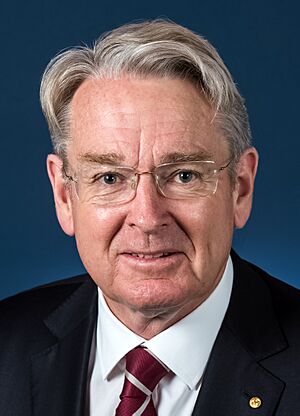Richard Court facts for kids
Quick facts for kids
Richard Court
|
|
|---|---|
 |
|
| Australian Ambassador to Japan | |
| In office 11 April 2017 – 2020 |
|
| Preceded by | Bruce Miller |
| Succeeded by | Jan Adams |
| 26th Premier of Western Australia | |
| In office 16 February 1993 – 10 February 2001 |
|
| Monarch | Elizabeth II |
| Governor | Sir Francis Burt Michael Jeffery John Sanderson |
| Deputy | Hendy Cowan |
| Preceded by | Carmen Lawrence |
| Succeeded by | Geoff Gallop |
| Leader of the Opposition in Western Australia |
|
| In office 12 May 1992 – 16 February 1993 |
|
| Premier | Carmen Lawrence |
| Deputy | Colin Barnett |
| Preceded by | Barry MacKinnon |
| Succeeded by | Carmen Lawrence |
| Member of the Western Australian Parliament for Nedlands |
|
| In office 13 March 1982 – 27 April 2001 |
|
| Preceded by | Charles Court |
| Succeeded by | Sue Walker |
| Personal details | |
| Born |
Richard Fairfax Court
27 September 1947 Nedlands, Western Australia, Australia |
| Political party | Liberal Party |
| Spouse | Jo Court |
| Relations | Charles Court (father) |
Richard Fairfax Court AC (born 27 September 1947) is a former Australian politician and diplomat. He served as the leader of the government in Western Australia, known as the Premier of Western Australia, from 1993 to 2001. Later, he was the Australian Ambassador to Japan from 2017 to 2020.
Richard Court was a member of the Liberal Party. He represented the Perth area in the Western Australian Legislative Assembly (the state parliament) from 1982 to 2001. His father, Sir Charles Court, was also a Premier of Western Australia.
Contents
Early Life and Family
Richard Court grew up in a family involved in politics. His father, Sir Charles Court, was the previous representative for Nedlands in parliament and served as Premier from 1974 to 1982. Richard's older brother, Barry Court, was also involved in politics, becoming the President of the Liberal Party in Western Australia in 2008.
Richard Court attended Hale School and then studied at the University of Western Australia. He earned a Bachelor of Commerce degree in 1968. After university, he worked for a year at Ford Motor Company in the United States. When he returned to Western Australia, he started and ran several businesses. These included food stores and companies that made and sold marine and boating equipment.
In the mid-1970s, Richard Court was a sailor of 18 Foot Skiffs. He helped develop a new feature for these boats called a "sliding rack." This invention helped the boats go faster by making them more stable. This idea was later simplified into "fixed wings" and is now common on many sailing skiffs.
Political Career
In March 1982, Richard Court was elected to parliament in a special election. This election happened after his father retired from politics. Richard took over his father's seat, Nedlands, which is in a wealthy area of Perth.
His time as a government member was short. The Labor Party won the state election in 1983. Court then became a spokesperson for the opposition in 1984. He spoke on topics like resources, mining, and Aboriginal affairs. In 1987, he became the deputy leader of the Liberal Party. He then became the leader in 1992.
Premier of Western Australia
In February 1993, the Liberal Party and their partners, the Nationals, won the state election. They formed a government with a strong majority. This happened after a special investigation, called the WA Inc royal commission, looked into some deals made by previous Labor governments.
The Court government was re-elected easily in 1996. The Liberal Party even won enough seats to govern on their own for the first time. However, Premier Court chose to keep the partnership with the Nationals.
During his second term, Court's popularity decreased due to some issues. These included concerns about deals made between the government and his brother, Ken Court. There was also a finance broking issue where many older people lost their savings. An investigation found that the government had not managed this industry well. Another important issue was the continued cutting down of old forests in the South West of Western Australia.
In the 2001 state election, the Labor Party, led by Dr Geoff Gallop, won by a large number of seats. This was a big change in voter support.
Leaving Politics
After losing the election in February 2001, Richard Court decided to retire from politics. Colin Barnett then took over as the leader of the Liberal Party.
Life After Politics
On 9 June 2003, Richard Court received a high honor. He was appointed a Companion of the Order of Australia (AC). This award recognized his service to the Western Australian Parliament and the community. It also noted his work in child health research, cultural heritage, and economic development. This included helping to arrange the export of gas to China, which benefited Australia.
In November 2016, it was announced that Court would become the Australian Ambassador to Japan. He officially started this role on 11 April 2017, presenting his credentials to Emperor Akihito in Tokyo. He served as Ambassador until October 2020, when Jan Adams took over the role.
See also
- Court–Cowan Ministry
 | William M. Jackson |
 | Juan E. Gilbert |
 | Neil deGrasse Tyson |

